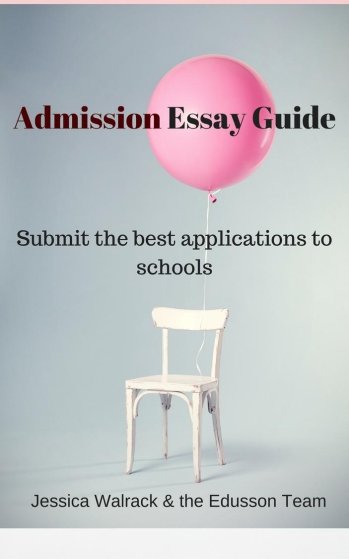
Admissions officers go through thousands of applications a year, so it’s only logical that they will notice those that bring a unique personality to life. Let them discover that!
A college application essay is usually around 500 words, and those words can mean the difference between acceptance and rejection. You will spend many days researching and crafting your essay, but admissions officers will only have a few minutes to actually read it, so you need to get their attention.
If you don’t follow the application essay guidelines, the admissions officer may assume that you won’t be able to follow the directions of the university’s program. Page and word limits are mentioned for a reason and you must be able to organize your submission by following the rules.
That means that every time you want to express an idea, you don’t simply state a fact, but you also include specific details and examples to develop your ideas. You can do that by offering examples from your personal experiences and writing about what truly motivates you and how you developed a certain belief.
4. Avoid clichés

After you’ve read through the instructions a few times and gathered your notes, you can start creating an outline to organize your essay and decide what message you want to send. Now you're ready to write your first draft.
The admissions officers will only spend a brief amount of time reviewing your essay, so you need to start with a vivid paragraph that will keep them engaged. The introduction has to reveal to the reader what your essay is about and catch their attention. You could open with an anecdote or an interesting story that will show some of the best parts of your personality and character, offering an insight that will help the admission officers get to know who you are.
You’ve completed all the application forms, taken all the tests, and now it’s finally time to impress your university’s admission officers with a great college application essay.
If you ask a teacher or parent to proofread your essay, they will be able not only to catch mistakes, but also to check if the writing sounds like you. After reading so many examples and following all those instructions, it’s hard to tell if what you just wrote is a statement of who you really are or not. Enlist the help of others to make sure that your essay is immaculate.

Are you able to provide clear, supporting paragraphs for your essay topic? If you can’t provide concrete examples to support your topic, then you should probably choose something else.
Different schools have different requirements for the admission essay. Before you begin, read through the specific requirements of the school and make sure you understand them. If there is a question to be answered, you want to make sure you fully answer it.
- First, what are some of your major accomplishments? Keep in mind, some of the best answers to this question aren’t necessarily accomplishments for which you have been recognized.
- Why do you consider a certain accomplishment an accomplishment?
- Do you have any skill, quality or attribute that distinguishes you from others, and how did you develop this attribute?
- Are there any works of art, movies or books that have influenced your life in a particularly meaningful way?
- Looking back on your life, what has been a particularly difficult time and how did your perspective on life change because of it?
- Have you struggled with something and eventually succeeded? What do you think made you successful?
- On the flip side, have you ever struggled for something and ultimately failed? What was your response to this failure?
- If you had a choice to do anything in the world, what would you be doing and why?
- If you had a choice to spend time with anyone alive or dead, who would you choose?
- Have you ever experienced an epiphany? What helped open your eyes to something you were overlooking before?
- What do you believe is your strongest personality trait?
- Do you adhere to a specific personality or maintain strong beliefs?
- How would others, such as your friends, describe you?
- Have you done anything outside the classroom that demonstrates qualities that are often sought after by universities? Which one of these qualities is the most important to you?
- What do you think are the most important community or extracurricular activities and why did you choose to join these activities? Why did you continue to contribute to these activities?
- What are your dreams and future plans? If you were to look back in your life in thirty years, what do you think it would take to consider your life as successful? What are accomplishments important to you, and how does this university fit in with your plans for the future?
- Lastly, how will attending your chosen university help you meet your goals? How will an education help to meet your needs and help you lead a fulfilling life?
Can you discuss a topic while fully answering the questions that have been asked of you? Are you able to elaborate and address the points specified in the word limit? Are you able to keep the reader’s interest from the very beginning of the essay?
Brainstorming

If asking yourself the above questions do not give you enough cohesive ideas, you can ask for help from friends, parents, and colleagues. They can provide you with information such as your top five personality traits. After they have provided you with a list, ask them why they chose those personality traits. As you discover an image of your personality, start to ponder life experiences that can illustrate these particular traits.
Brainstorming can also include a session of reading sample admissions essays. Do an online search to find websites that include archives of free admissions essays such as this site.
Considering the fact that the admission essay may be a determining factor on a college application, it is worth the time to learn how to do it right. After all, you don’t want to spend all your time putting together a great application and fail on the essay. Here are a few things to writing an admission essay.
Schools love the idea of diversity and every school wants to increase theirs. Because of this, many applicants are tempted to write about their qualities that can bring diversity to the school. However, this must be done carefully as you still need to impress the admissions office. Simply stating what makes you different will not set you apart. Showing the ability to demonstrate how you overcame any stigma, demonstrating interests, personal qualities and motivations is wise. Make sure to include how your diversity will contribute to the campus as a whole.
- Try evaluating the piece from the examiner's perspective
So we have put together the most helpful college admission essay tips to give you the best chances of beating admission.
When writing the college admission essay conclusion, our custom writing professionals suggest you tie up all the evidence previously stated into one or two important ideas. Make the last statements in conclusion memorable so to leave a good impression on the reader and even use the best vocabulary available. Do not over-word your sentences to sound more intelligent. Advanced vocabulary should be used to spice up the work, but if overused, it can make it pompous, so check that the level synonyms are fitting to the topic and your own writing style.
“ Share an essay on any topic of your choice. It can be one you've already written, one that responds to a different prompt, or one of your own design. ”
Conclusion

Before diving into your college admission essay, it is always a good idea to take a step back from your ideas for the questions and plan out what you want to write. This will make the process of writing the work much faster and easier in the long run.
One of the most challenging admission essay prompts was given out by a single word by one of the Oxfords affiliates. However, most colleges will give you more than just that to work with.
Basically, it doesn't matter too much which question you chose but what is vital that your writing is up to the job!
Most questions are the same every year but with minor changes to the wording for example. This year two new prompts have been added to the selection and now is the time to start planning your work so you can get your application handed in as soon as possible to give you the best advantage.
![]()
Ideally, the material you choose to include in your career goals essay will also allow you to demonstrate your knowledge about industry trends, and point to how your particular abilities can help make a contribution to that field.
In our How to Write Exemplary Application Essays blog series, you’ll learn how to create exemplary essays by analyzing sample successful application essays.
She establishes her theme in this opening, and then gives the context for her MBA goal. Notice that in writing about her work as an accountant for a major firm, she provides relevant details, including how many years she has been in this field, her bilingual abilities, and specialty area as an auditor. This is the springboard from which she explains why she is pursuing the MBA – her role as an accountant is too limited for her to achieve her career goals as a money manager.
Choose among the experiences you have had, either at work or through a community or extracurricular activity, that will showcase your leadership, creative thinking, and collaborative abilities.
Putting these ingredients together to create your goals essay
![]()
Your goal can’t just appear out of thin air
Explain why your career goal makes sense in light of your experiences and influences so far
Demonstrate why you are suited to a particular fieldas a result of your education, experience, abilities, and enthusiasm

Raising the Stakes: The entire second and third paragraphs, which describe how living without a father meant money was tight. Things improved for a while after his mother remarried, but his stepdad’s chronic alcoholism (raise the stakes) plus a new little brother (raise the stakes again) made things even tougher. As if that weren’t enough, the author raises the stakes even further by revealing that his family was undocumented at the time.
Collaboration? Efficiency? Hands-on work? Probably yes to all three.
If you answered “yes” to both questions at the beginning of this guide, I recommend exploring Narrative Structure. I’ll explain this in more detail below.
If your answer is “Maybe … ?” because you’re not sure what qualifies as a challenge, it’s useful to think of challenges as being on a spectrum. On the weak end of the spectrum would be things like getting a bad grade or not making X sports team. On the strong end of the spectrum would be things like escaping war. Being extremely shy but being responsible for translating for your family might be around a 3 or 4 out of 10.
Narrative Structure
A: For sure. Say you’re interested in becoming a doctor, but you’re applying to a medical program with a supplemental prompt asking why you want to become a doctor. If you want to avoid repetition, you might not explicitly mention becoming a doctor at the end of your personal statement (you don’t have to discuss your career at all in a personal statement
Sports have had a powerful influence on me, from my understanding of history, to numbers, to my relationships, extracurricular activities, and even my career choice.
Heads-up: Some students who have faced challenges find after reading that they prefer Montage Structure to Narrative Structure. Or vice versa. If you’re uncertain which approach is best for you, I generally recommend experimenting with montage first
What She’s Learned/Gained: She found a sense of purpose and discovered “everything [she has] to be grateful for.” She writes: “War has taught me to never take an education or a story for granted, to find beauty in vulnerability, to remain critical of authority figures, to question what’s socially accepted, and best of all, to celebrate humor.”


